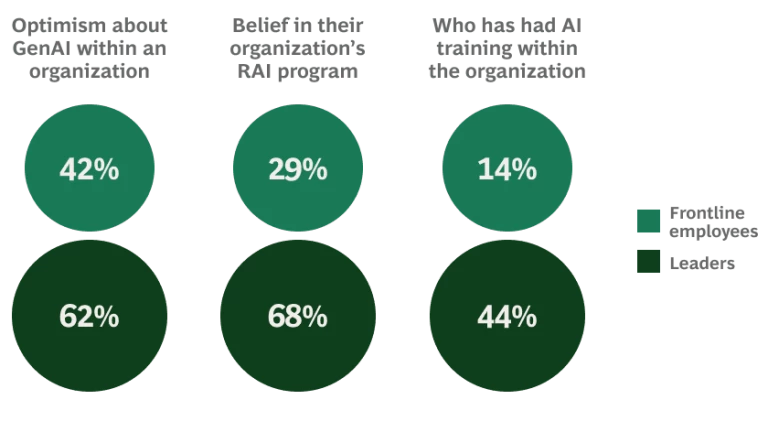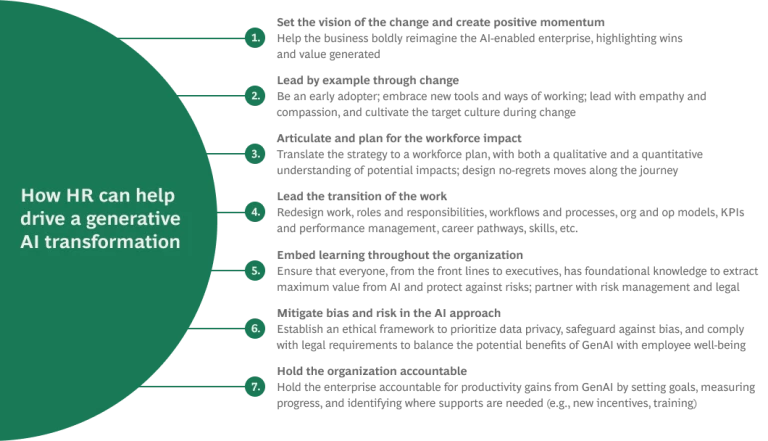If there’s one thing everyone agrees on when it comes to generative AI, it’s that it will change the work we do—in many cases profoundly. GenAI will replace certain tasks, augment others, and create still more. And it will require leaders and frontline employees alike to upskill, reskill, and learn entirely new ways of working.
Generative AI holds immense potential for increasing productivity and innovation. But to fulfill that potential, we’ll need to make sure that, as with all AI technology, it is implemented in ways that complement our own innate and irreplaceable human skills—allowing us to make better decisions while applying our creativity and emotional intelligence.

While workers are understandably nervous about artificial intelligence, attitudes are evolving. Our recent survey of nearly 13,000 executive suite leaders, middle managers, and frontline employees in 18 countries showed that the average respondent today is far more optimistic about AI than the average respondent was five years ago.
Even so, there are vast differences in perceptions of AI between leaders at the top and employees on the frontline. Leaders are much more optimistic than frontline employees about GenAI (62% vs. 42%), for example. They’re also much more likely to be familiar with the technology: 44% of leaders say that they have received training on AI tools, while only 14% of front-line employees say that they have received similar training. And while 68% of leaders believe that their organization has an adequate responsible AI program in place, only 29% of frontline employees feel the same way.
Employees are prepared to accept AI in the workplace, but only if they are confident that their employer is committed to deploying AI tools ethically and responsibly, and in ways that benefit them. With that in mind, organizations can’t simply focus on the technology—they need to transform how their people work, collaborate, solve problems, and create value.
A People-Focused Approach
In our experience, the companies that capture the most value from AI follow the 10-20-70 rule : 10% of their AI effort goes to designing algorithms, 20% to building the underlying technologies, and 70% to supporting people and adapting business processes.
Given the rapid pace at which generative AI is developing, getting the 70% right is more important than ever. Nearly every task an organization performs will be affected; in many areas, operating models will be flattened, becoming less hierarchical and more agile, and organizational layers will be reduced. To unlock AI’s full potential, employees at all levels of an organization will need to be comfortable learning new skills and adapting to new roles.
Companies that have reaped the greatest benefits from AI systems already understand this. They have not succeeded simply because they’ve learned how to change in the era of AI. Instead, they have transformed their companies into learning organizations. And with GenAI, the pace of that learning will accelerate rapidly.
As will the potential benefits. By applying the right structure and approach to GenAI transformation, companies can generate significant gains in productivity—as much as 20% to 30% in some applications. On the other hand, there’s a significant risk of losing value if GenAI is deployed without proper organization to support it.
Choosing the right context for GenAI implementation is absolutely essential. In a recent experiment conducted in partnership with Harvard Business School, MIT Sloan School of Management, the Wharton School at the University of Pennsylvania, and the University of Warwick, we found that the use of GPT-4 improved average performance by 18% on GenAI-friendly tasks; in the case of tasks the technology had not yet mastered, however, performance declined by an average of 23%.
Among the other risks posed by generative AI:
Mismanaged Implementation. Inefficient processes and rigid ways of working can erode the potential benefits of generative AI—as can the lack of an enterprise-level strategy, which could lead to individual business units making their own decisions about the best applications and use cases. Limited buy-in from employees and talent or skill deficiencies can also diminish value creation.
Irresponsible Use. Without the proper safeguards in place, companies can expose themselves to data leaks or misleading or unethical content generation. When developing and refining GenAI models, leaders must implement strong responsible AI safeguards that protect organizational data, and they must ensure that all content developed via generative AI is reviewed to ensure information is accurate, ethical, and adheres to responsible AI policy.
Bias. GenAI models must be trained on culturally, linguistically, and socially diverse data. Educating employees to minimize bias in their prompts and recognize it in their outputs is also critical. Ultimately, the organization wants outputs that give objective and value-driving answers, and bias impedes both.
It’s exceedingly difficult to capture value after GenAI systems are implemented. Leaders are best served thoroughly refining processes and talent expectations as the technology is deployed.
Finding, Growing, and Supporting AI Talent
Because generative AI and other AI tools will affect nearly every part of an organization, HR must take a central role in implementation. This means more than just identifying and attracting the right AI talent—it means helping set the vision for the entire company, leading by example through GenAI adoption, building learning and development capabilities through reskilling and upskilling programs, and ensuring that all AI systems are used in an ethical way that enhances employee well-being.

As HR helps lead the company-wide strategic transformation, GenAI technology can be a vital resource for the HR function itself. It can be used to provide “always on” delivery of personalized employee self-service experiences, and it can lead to significant productivity enhancements across the full range of hire-to-retire processes. By doing so, GenAI will free HR professionals to engage more fully with the workers they serve.

Most HR professionals will need to become more tech-savvy both as they interact with AI in some form and as the function seeks insights, builds its own technology models, and acts as advisors to other business units. GenAI in particular will help talent acquisition and talent management positions come together into a talent ecosystem role that oversees strategic workforce planning; skills; career paths; succession plans; and recruiting.
Through all of this, HR will need to work with leaders to ensure that responsible AI is being implemented and that any bias apparent in AI systems is understood and addressed—bias in hiring algorithms that may influence the resume screening process, for example. For all of AI’s promise, HR will need to ensure that humans remain the primary, critical agents of success, with their actions and decisions augmented—not replaced—by AI.
Setting a Course for Change
The arrival of generative AI presents an extraordinary challenge in terms of change management. Workers, understandably, will be concerned about job safety or how their roles might be affected; as such, it’s critical for leaders to emphasize that GenAI tools are meant to complement the work employees do. The emphasis should be on which tasks will be replaced, not which jobs.
To build trust, leaders must instill a culture of experimentation and learning throughout an organization, with a focus on empathy and creativity as well as growth. It’s also essential for leaders to prioritize the responsible use of AI; employees should be assured that generative AI and other related technologies are being implemented and used in an ethical manner.

Our research has found that, in addition to creating value for organizations, using AI creates value for individual employees . It gives them sharper insights and more detailed, granular information, thus enabling them to make better decisions. And it allows for increased autonomy, empowering employees to make more of those decisions without the direct support of a manager.
When AI leads to improved business processes, the technology tends to strengthen workplace culture. And companies that report better efficiency and decision making—thanks to AI—also report improvements in collective learning, morale, collaboration, and role clarity.
How to Get Started with GenAI
Though we’re only beginning to understand the breadth of capabilities of generative AI, it’s clear that there’s significant value in being an early adopter—particularly if your initial forays into GenAI are successful. We recommend that leaders take the following steps:
- Assess the technology and workforce skills needed for the transition. This will inform the enterprise-level strategy, including whether to develop a “build, buy, or borrow” talent strategy.
- Establish a robust central team to own the development and execution of GenAI use cases. This team should take a holistic view on the transformation, with a focus on delivering impact and setting goals and direction across the organization.
- Build a culture of experimentation and launch pilot projects in priority areas. Identify use cases that are GenAI friendly, but exercise caution when considering the technology for tasks it has not mastered, where GenAI can actually erode value.
- Ensure the HR function has a seat at the table to identify and address hiring gaps and to guide the evolution of responsibilities. GenAI will create new roles and skills for employees across the organization, and that process will require high-touch HR support.
- Upskill and reskill to effectively support your people. It’s crucial to develop a strong learning pathway for employees, both to introduce core concepts and to define what GenAI means for each individual role.
The generative AI revolution has arrived, and it will require a top-to-bottom reimagination of how organizations are designed; companies that fail to build GenAI into their core will only see incremental gains at best. From leaders and managers to frontline employees, GenAI and other AI tools will make technologists of us all.






